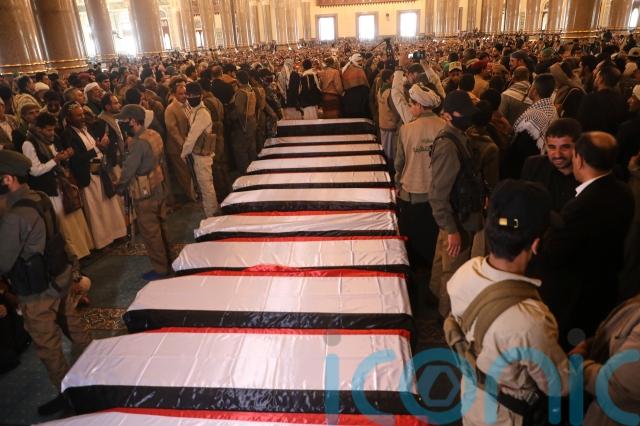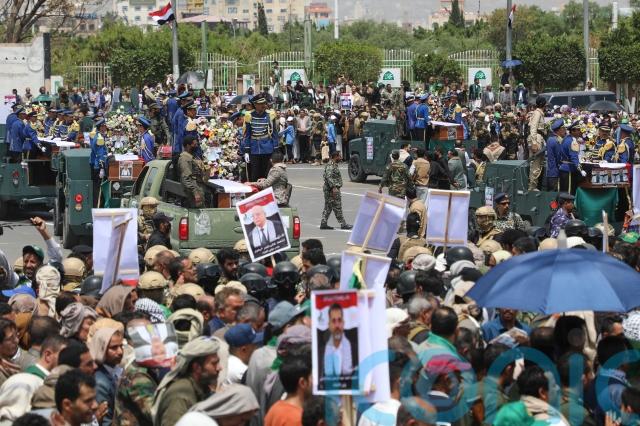
Hundreds of Yemenis mourned the death of Houthi prime minister Ahmed al-Rahawi, killed last week along with several officials by an Israeli strike, as the group targeted an oil tanker in the Red Sea – renewing their attacks in the crucial global waterway.
The Israeli attack came three days after the Houthis launched a ballistic missile toward Israel that its military described as the first cluster bomb the Iranian-backed rebels had launched at it since 2023.
In the capital city of Sanaa, mourners attended the funeral, held at Shaab Mosque and broadcast by Al-Masirah TV, a Houthi-controlled satellite news channel.
Crowds inside the mosque chanted against Israel and the United States as they grieved the deaths of the officials, including the foreign affairs, media and culture, and industrial ministers.
Funeral attendees Ahmed Khaled and Fathy Mahmoud told The Associated Press the families of the slain officials arrived in ambulances for the funeral, where the bodies were placed in caskets inside the mosque.
Footage showed 11 coffins with individual photos of the killed officials on each and wrapped in Yemeni flags.

“We’re participating in this funeral because Israel killed those officials and that’s enough reason to attend their funeral,” Ahmed Azam, another attendee, told the AP.
Mr Al-Rahawi was the most senior Houthi official to be killed since an Israeli-US campaign against the rebel group started earlier this year.
Other ministers and officials were wounded, confirmed a Houthi statement on Thursday, following the Israeli attack.
“We entered a huge and influential war and clashed with the US This war was not only military-focused but also economic as Israel targeted everything,” acting Houthi prime minister Mohamed Muftah said in his address at the funeral on Monday.
He confirmed that despite Israeli attacks, Yemeni ports controlled by the group are still functioning and that there is no food or fuel crisis.
The Yemeni rebels said on Monday they launched a missile at an oil tanker off the coast of Saudi Arabia in the Red Sea.
Houthi military spokesman Brig Gen Yahya Saree claimed responsibility in a prerecorded message aired on Al-Masirah.
He alleged the vessel, the Liberian-flagged Scarlet Ray, owned by Eastern Pacific, had ties to Israel.
The maritime security firm Ambrey described the ship as fitting the Houthis’ “target profile, as the vessel is publicly Israeli owned”.
Eastern Pacific is a company that is ultimately controlled by Israeli billionaire Idan Ofer and had been previously targeted in suspected Iranian attacks.

In a statement, the company said “the vessel has not sustained any damage and continues to operate under the command of its Master. All crew members onboard the Scarlet Ray are safe and accounted for”.
The Houthi rebels have been launching missile and drone attacks on Israel and on ships in the Red Sea in response to the war in Gaza, saying they were acting in solidarity with Palestinians.
Their attacks over the past two years have upended shipping in the Red Sea, through which about one trillion dollars of goods pass each year.
The Iranian-backed Houthis stopped their attacks during a brief ceasefire in the war. They later became the target of an intense weeks-long campaign of airstrikes ordered by US president Donald Trump before he declared a ceasefire had been reached with the rebels.
The Houthis sank two vessels in July, killing at least four on board, with others believed to be held by the rebels.
The Houthis’ fresh attacks come as a new, possible ceasefire in the Israel-Hamas war remains in the balance.
Meanwhile, the future of talks between the US and Iran over Tehran’s battered nuclear programme is in question after Israel launched a 12-day war against the Islamic Republic in which the Americans bombed three Iranian atomic sites.
Subscribe or register today to discover more from DonegalLive.ie
Buy the e-paper of the Donegal Democrat, Donegal People's Press, Donegal Post and Inish Times here for instant access to Donegal's premier news titles.
Keep up with the latest news from Donegal with our daily newsletter featuring the most important stories of the day delivered to your inbox every evening at 5pm.